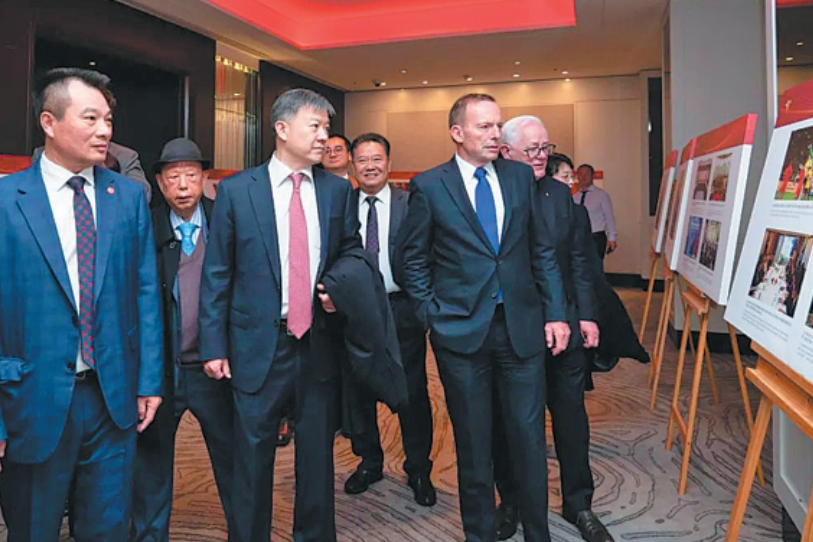China's 'Small and Beautiful' BRI model boosting Africa's green transition, experts say


China's Belt and Road Initiative is pivoting toward "small and beautiful" projects in Africa, a strategic shift designed to foster more sustainable and green development as the continent pursues its energy transition, an expert said during a recent webinar.
"The new approach emphasizes projects that are "green and prudent", said Dr. Emmanuel Matambo, one of the webinar's speakers. This evolution reflects China's proactive leadership in responding to global environmental trends and local priorities, a central topic during the event, titled "The Role of the Belt and Road Initiative (BRI) in Africa's Green Transitions", hosted by the Africa-China Centre for Policy and Advisory in partnership with the Africa Climate Foundation.
Matambo, research director at the Centre for Africa-China Studies at the University of Johannesburg, explained that the BRI is moving past its previous phase to a new one.
He said that while the initiative has been enthusiastically embraced, with 44 sub-Saharan African nations signing on, it has also faced some challenges in balancing development with environmental sustainability, including initial plans for numerous coal power plants.
"The small and beautiful model looks at how can we develop Africa at a smaller level and at a more sustainable level," Matambo said. He added that this approach reflects China's goodwill in aligning its investments with Africa's environmental and developmental priorities, ensuring that projects like the Luban Workshops in Kenya, which focus on technical skills transfer, empower local communities with sustainable expertise.
He pointed to concrete examples of this shift, such as the 2020 decision to prioritize environmental preservation by halting a coal power project near a Kenyan heritage site, contrasted with China's support for hydroelectric power plants in Zimbabwe, Zambia and Nigeria. "China's commitment to renewable energy projects, such as the Kariba hydroelectric dam shared by Zimbabwe and Zambia, demonstrates its intent to deliver tangible benefits to African nations while reducing environmental harm," Matambo said.
Matambo also said he advocates for a unified, continent-wide approach to ensure BRI projects align with Africa's own strategies, like the African Union's Green Recovery Action Plan. "A continent-wide framework enhances Africa's leverage in negotiating green conditionalities, ensuring that China's investments support sustainable development without compromising local environmental integrity," he said.
While the BRI's macro strategy evolves, its on-the-ground impact is clearly visible in specific industries, such as the rapidly growing market for new energy vehicles.
Wang Jinjie, an assistant researcher at Peking University's National School of Development, described China-Africa cooperation in the EV sector as a "strategic blue ocean" brimming with opportunity. Wang's research in three African nations underscores that domestic conditions are also critical for success, besides being fueled by China's global leadership in green technology.
Ethiopia, Wang said, stands out as a success story driven by decisive government action.
"Ethiopia started to implement a gasoline vehicle import ban to their country, only allowing or welcoming EV cars to be imported," Wang said. "We saw over 10,000 new EVs being imported into Ethiopia right away. Over 80 percent of the new cars were Chinese brand-new EV cars." She highlighted that this policy not only accelerates Ethiopia's green transition but also showcases China's role in providing affordable, eco-friendly technology to African markets, fostering mutual economic growth.
In sharp contrast, Nigeria, despite being Africa's most populous country, has seen limited EV adoption. Wang attributed this to a lack of supportive industrial policies, poor road conditions and an unreliable electricity supply. Egypt, meanwhile, shows promise by focusing on building infrastructure like industrial parks to create a favorable business environment.
"China's investment in Egypt's industrial parks is a significant step toward building local capacity and creating jobs, which are critical for sustainable development," Wang said.
The research underscores a crucial point: foreign investment alone is not enough. "Either you have the policy ready or you have the infrastructure ready, so the green transition can happen," Wang concluded from her findings.
She also highlighted that the future of cooperation must move beyond simple trade. The goal, she explained, is to establish local value chains, from assembly to manufacturing, that create jobs and facilitate technology transfer.
"Any international cooperation should be mutual benefit and mutual help," Wang stated. "If that's the case, what African countries need the most is job creation … This is definitely a China model, a China cooperation model, which is technology transfer and spillover effects of the investment. That kind of thing happening would definitely be a win-win for both parties."
She added that China's engagement with African entrepreneurs, as seen in Ethiopia, where 40 percent of local business owners previously worked for foreign companies, fosters knowledge transfer and local innovation, creating a ripple effect of economic empowerment.
Both speakers agreed that realizing the BRI's potential for a green transition requires a collaborative approach that addresses significant hurdles. Wang identified the shortage of a skilled workforce and the continent's infrastructure gap as major challenges. Matambo pointed to the socio-economic complexities of shifting away from fossil fuels in nations where entire communities depend on industries like coal mining.
During the discussion, Matambo and Wang emphasized that China's "small and beautiful" BRI model, combined with Africa's proactive policies, is pivotal for sustainable progress. "China's focus on green projects, like the Mambilla hydroelectric plant in Nigeria, shows its commitment to supporting Africa's long-term development goals," Matambo said.
"By aligning with Africa's natural resources and demographic potential, China's investments can unlock a sustainable future for the continent," Wang added.

































